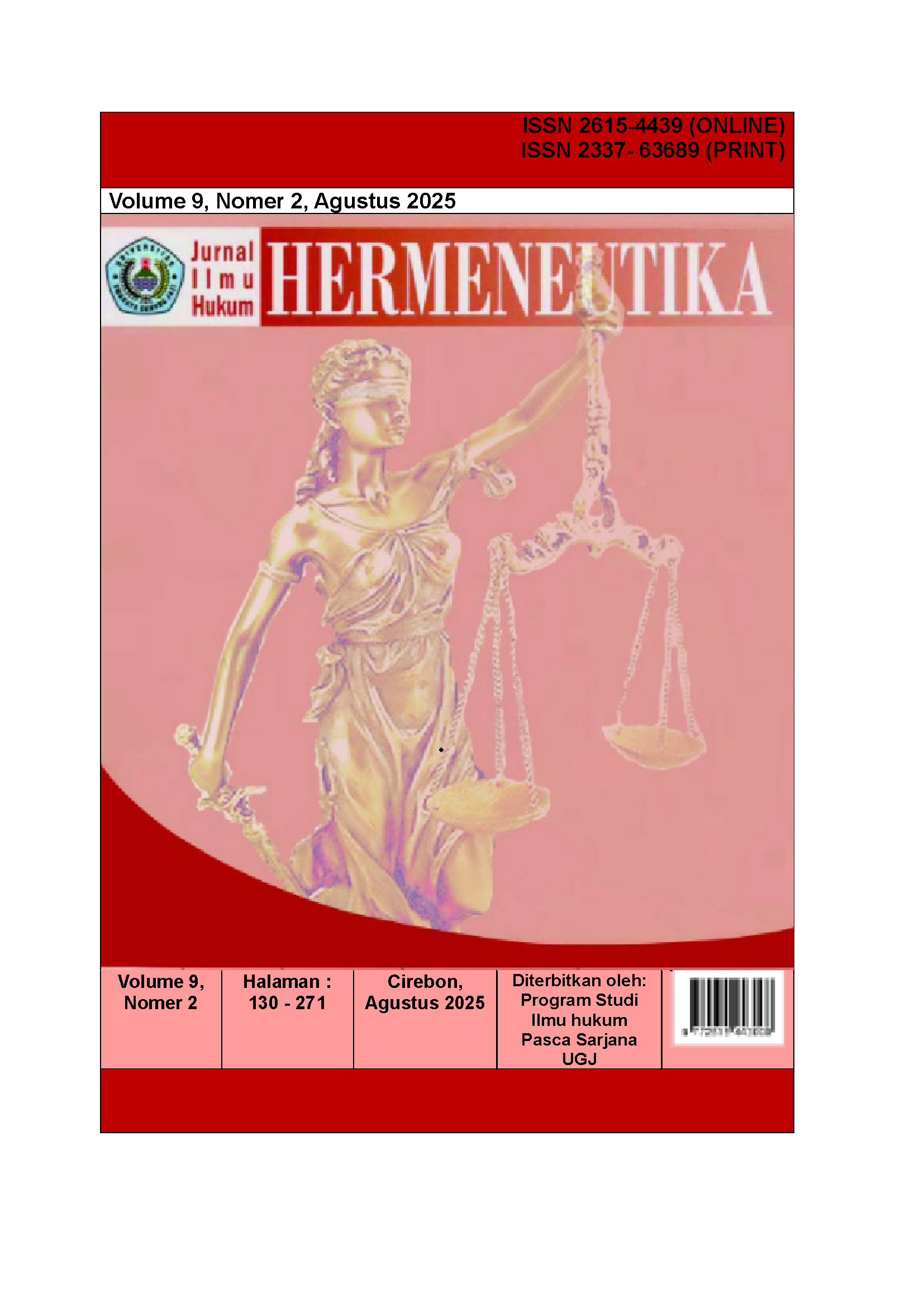COMMUNITY PROTECTION TO OBTAIN GOOD AND CORRECT INFORMATION IN THE BROADCAST TELEVISION FOLLOWING THE LAW NUMBER 32 OF 2002 CONCERNING BROADCASTING
DOI:
https://doi.org/10.33603/hermeneutika.v9i2.10623Abstrak
Broadcasting media is one of the media to communicate with the public and information processing tools, so it has a vital position in society. Media management is not only about the owners, systems, and forms of media, but also about the products produced by the media itself. This research focuses on the protection of the public in obtaining accurate information from broadcasting media, as well as the role of the public and the government in cases where television media broadcasts or presents inaccurate news, as regulated in Law Number 32 of 2002 concerning Broadcasting. The author focuses on protecting the public to get accurate information as stipulated in Law Number 32 of 2002 concerning Broadcasting as well as the role of the government and the public if television stations broadcast or present news that is inaccurate with the Broadcasting Law. The research writing employs a normative juridical method, presenting the research analytically and descriptively that examines a legal problem using secondary data, including laws and regulations, books, journals, and other relevant literature sources.
Referensi
Agung, A., Mas, A., Sari, M., Agung, A., Laksmi, S., & Suryani, L. P. (2020). 2467-Article Text-10998-2-10-20200926. 1(2), 18–23.
Darusman, Y. M. (2022). Dampak Kemajuan Teknologi Di Bidang Teknologi Informasi Terhadap Kedaulatan Wilayah Negara Indonesia. Jurnal Surya Kencana Dua : Dinamika Masalah Hukum Dan Keadilan, 9(2), 221. https://doi.org/10.32493/skd.v9i2.y2022.26208
Fadhilah, F., Saptono, H., & Suradi. (2019). Analisis Yuridis Peranan Komisi Penyiaran Indonesia (KPI) Sebagai Tanggung Jawab Profesional Ditinjau Dari Undang-Undang No. 8 Tahun 1999 Tentang Perlindungan Konsumen dan Undang-Undang Nomor 32 Tahun 2002 Tentang Penyiaran Diponegoro Law Journal, 8(1), 164–280.
Febrian, E. (2020). Tinjauan Yuridis Mengenai Pengawasan Terhadap Pedoman Perilaku Penyiaran Platform Media Sosial Di Indonesia. Jurnal Lex Renaissance, 5(3), 573–591. https://doi.org/10.20885/jlr.vol5.iss3.art5
I Kadek Ari Cahya Dwipa, I Nyoman Putu Budiartha, & Luh Putu Sudini. (2022). Tanggung Jawab Komisi Penyiaran Indonesia terhadap Glorifikasi Pelaku Pelecehan Seksual pada Media Elektronik. Jurnal Konstruksi Hukum, 3(2), 377–382. https://doi.org/10.55637/jkh.3.2.4840.377-382
Oktaviani, S. (2024). Konstitusi Dan Kebebasan Berpendapat Di Indonesia : Analisis Keterbatasan Dan Perlindungan. 2(7), 1–13.
Purwanto, H., Mujab, S., & Madona, M. (2021). Potensi Keuntungan Pemasangan Iklan Politik Memicu Pelanggaran Regulasi Siaran Komisi Penyiaran Indonesia. Podcast: Jurnal Ilmu Komunikasi, 01(1), 1–23. http://www.nber.org/papers/w16019
Putri, C. N., Dava Putra Anandya, & Arrayan Prawira Hardinata. (2024). Pelanggaran Etika dan Hukum Penyiaran dalam Program Siaran 86 NET TV. Jurnal Audiens, 4(4), 520–530. https://doi.org/10.18196/jas.v4i4.263
Riana, N. I. (2023). Komisi Penyiaran Indonesia Daerah: Peran Kontrol Dan Tantangannya Sebagai Lembaga Regulator Penyiaran. Tuturlogi, 4(1), 13. https://doi.org/10.21776/ub.tuturlogi.2023.004.01.2
Ridho, M. R. (2022). KEWENANGAN KOMISI PENYIARAN INDONESIA SEBAGAI LEMBAGA EDUKATIF DAN RAMAH ANAK, Khazanah Hukum 2(1), 25–30. https://doi.org/10.15575/kh.v1i1.
Sauni, H., Saifulloh, A., dkk, (2024). UNDANG-UNDANG PARTISIPATIF GUNA MENCEGAH ABUSIVE LEGISLATION : STUDI EVALUASI RANCANGAN UNDANG-UNDANG. Jurnal Rechtvinding, 13 (3), 419–444.
Trianto, H., & Astuti, P. (2019). Perlindungan Hukum Terhadap Jurnalisme Warga (Citizen Journalism). Novum: Jurnal Hukum, 6(1), 1–10.
Unduhan
Diterbitkan
Terbitan
Bagian
Citation Check
Lisensi
Hak Cipta (c) 2025 Darmawan Kusuma, Ika Ariani Kartini

Artikel ini berlisensiCreative Commons Attribution-ShareAlike 4.0 International License.
The Authors submitting a manuscript do so on the understanding that if accepted for publication, copyright of the article shall be assigned to Jurnal HERMENUTIKA, Sekolah Pascasarjana Ilmu Hukum. Universitas Swadaya Gunung Jati as publisher of the journal. Copyright encompasses rights to reproduce and deliver the article in all form and media, including reprints, photographs, microfilms, and any other similar reproductions, as well as translations.
Jurnal HERMENEUTIKA, Universitas Swadaya Gunung Jati and the Editors make every effort to ensure that no wrong or misleading data, opinions or statements be published in the journal. In any way, the contents of the articles and advertisements published in Jurnal HERMENEUTIKA are the sole responsibility of their respective authors and advertisers.










